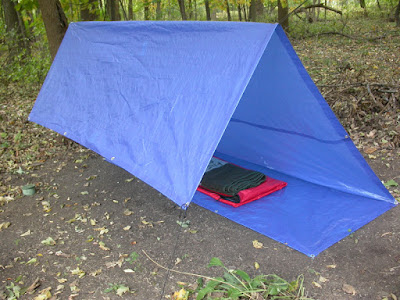You can probably imagine ten ways to use a tarp without thinking hard and at least as many reasons why they are so useful. Tarps make great coverage for items and people in numerous settings, all year round. They are inexpensive, easy to put up, durable, flexible, and portable. Certain types of tarps are huge while others are small and there are several types of material used to make them. Satisfy your local fire chief too by using fire retardant materials. There are so many reasons to have a tarp in the back of your truck or in the supply closet at your public field house and every possibility of purchasing one which is the ideal size for your needs.
Types of Tarps
Sizes can be gigantic, even large enough to cover a baseball diamond for little kids or adult players. Tarps might be small enough to spread out over a load of fire wood being stored outside the home, children's bicycles, or small electrical equipment which would otherwise be exposed to the elements and visible to vandals. Something in between would be a carport cover: that is, a covering to form a carport when you haven't built a structure yet or don't anticipate the need for a permanent cover. Materials are so sturdy the tarp could become your preferred year-round carport roof.
Canvas Tarps for Sale
Although tarps are constructed from polyethylene or vinyl as well, canvas is one of the best materials to select. It's inexpensive, light, flexible, and water resistant. Treated canvas tarps are flame-retardant and resist the build-up of mildew, a major health hazard.
Consumers purchase canvas tarps for multiple reasons and applications. These include agricultural, industrial, and household uses. A durable canvas material is one option on the farm where you need to protect machines designed to remain outside, cover hay against rain, or create a water-proof shelter for cows and sheep when they have been turned out of the barn to chew grass.
You can buy an 8 x 10-foot tarp for just over $50 and have it shipped to your home or business. These items range in size and orientation from long and narrow (10 x 24 feet) to square (12 x 12) but can also be custom cut to meet very specific needs on the job or at home. Select 12 oz canvas for tough situations and anticipated heavy weather or a smaller, lighter canvas of 10 oz measuring 6 x 8 feet costing roughly $30.
Consumers aren't paying for flash; these are generally available in neutral colors. One could almost regard them as stealthy shades, like khaki, sand, or dark forest green. Recommended website for more info.
Buy US Products
While there are lots of overseas companies competing for your business, consider purchasing a tarp that is made in the USA. Clients obtain high quality items created to exacting US standards and bearing a "Made in the USA" label. When consumers purchase tarps from an American company providing custom features, clients are able to ask for grommets and stitching to be reinforced. If the application is industrial, companies often have to meet even stricter standards than other businesses or individuals. Clients know when a product is likely to be treated roughly and subjected to rigorous use.
Types of Tarps
Sizes can be gigantic, even large enough to cover a baseball diamond for little kids or adult players. Tarps might be small enough to spread out over a load of fire wood being stored outside the home, children's bicycles, or small electrical equipment which would otherwise be exposed to the elements and visible to vandals. Something in between would be a carport cover: that is, a covering to form a carport when you haven't built a structure yet or don't anticipate the need for a permanent cover. Materials are so sturdy the tarp could become your preferred year-round carport roof.
Canvas Tarps for Sale
Although tarps are constructed from polyethylene or vinyl as well, canvas is one of the best materials to select. It's inexpensive, light, flexible, and water resistant. Treated canvas tarps are flame-retardant and resist the build-up of mildew, a major health hazard.
Consumers purchase canvas tarps for multiple reasons and applications. These include agricultural, industrial, and household uses. A durable canvas material is one option on the farm where you need to protect machines designed to remain outside, cover hay against rain, or create a water-proof shelter for cows and sheep when they have been turned out of the barn to chew grass.
You can buy an 8 x 10-foot tarp for just over $50 and have it shipped to your home or business. These items range in size and orientation from long and narrow (10 x 24 feet) to square (12 x 12) but can also be custom cut to meet very specific needs on the job or at home. Select 12 oz canvas for tough situations and anticipated heavy weather or a smaller, lighter canvas of 10 oz measuring 6 x 8 feet costing roughly $30.
Consumers aren't paying for flash; these are generally available in neutral colors. One could almost regard them as stealthy shades, like khaki, sand, or dark forest green. Recommended website for more info.
Buy US Products
While there are lots of overseas companies competing for your business, consider purchasing a tarp that is made in the USA. Clients obtain high quality items created to exacting US standards and bearing a "Made in the USA" label. When consumers purchase tarps from an American company providing custom features, clients are able to ask for grommets and stitching to be reinforced. If the application is industrial, companies often have to meet even stricter standards than other businesses or individuals. Clients know when a product is likely to be treated roughly and subjected to rigorous use.


